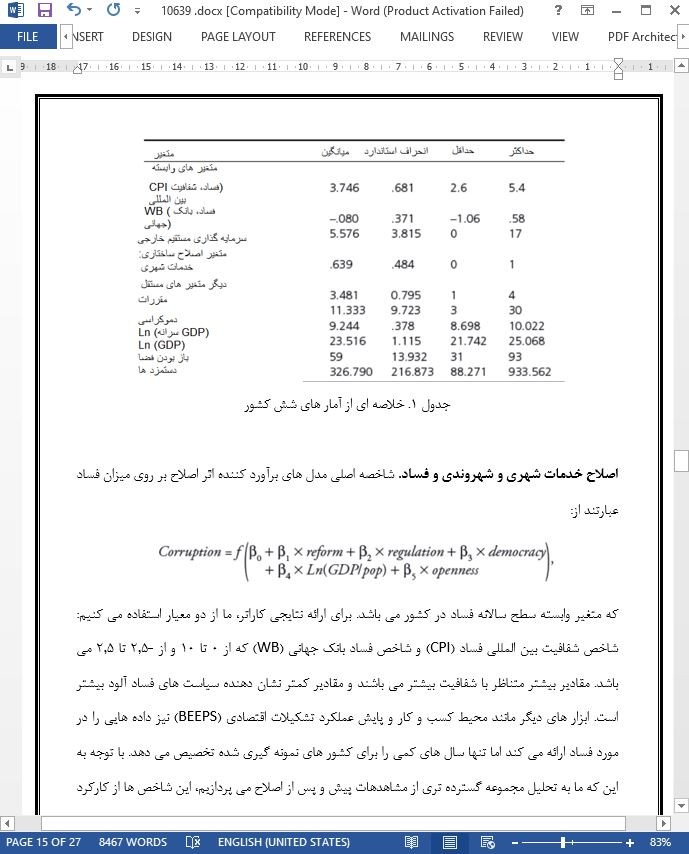
کارایی اصلاحات ساختاری و اداری در جوامع دموکراتیک جدید
مدیران اجرایی و محققین سیاست های پسا کمونیستی مخالف اجرای اصلاحات اداری جدید در جوامع دموکراتیک اروپای شرقی می باشند. تغییر در بخش دولتی پس از سال 1989 موجب تحکیم فرآیند دموکراتیک و بهبود توسعه اقتصادی شده است. با این حال منتقدین معتقدند که اصلاحات اجرایی مواجه با چالش های زیادی در حوزه لیبرالی کردن اقتصاد، ظرفیت نا چیز جهت مدرنیزه کردن و میراث فرهنگی گذشته می باشد. مولفین به بررسی کارایی و اثر گذاری اصطلاحات با ارزیابی اثر اصلاح خدمات شهری بر رویکرد و شفافیت دولت و سرمایه گذاری مستقیم خاربی می پردازند. نتایج تحلیل تجربی نشان می دهد که با پذیرش اصلاحات، مدیریت اجرایی از کارایی بیشتری در کاهش فساد و جذب سرمایه گذاری برخوردار خواهد بود. علی رغم تاخیر و دشواری های اجرایی، پذیرش اصلاحات حائز اهمیت بوده و کشور ها می توانند انتظار نتایج را در زمان کمتر نسبت به برآورد منتقدان داشته باشند.
پایه حاکمیت دموکراتیک موثر و کارا، وجود مدیریت اجرایی دولتی موثر می باشد که استاندارد های حرفه ای و یکپارچگی را به یکدیگر پیوند می دهد. از زمان فروپاشی کمونیسم در سال 1989، کلیه کشور های واقع در اروپای شرقی و مرکزی (CEE) اصلاحات خدمات شهری را با هدف تغییر بروکراسی های نا مناسب و سیاست زده خود به رویکرد های اجرایی حرفه ای در نظر گرفته و به کار گرفته اند. تغییرات گسترده سیاسی، اقتصادی و اجتماعی مستلزم به کار گیری یک نوع خدمت عمومی جدید با مهارت های حرفه ای مورد نیاز جهت انجام سیاست های جدید و حفظ حقوق شهروندان می باشد. با توجه به اهمیت به کارگیری این وظیفه، مطالعات تجربی به صورت سیستماتیک به ارزیابی کارایی اصلاحات خدمات شهری پرداخت اند (اندرسون، رید و ریترمن 2003؛ اوانز و راش 1999؛ راش و اوانز 2000؛ رکانتینی، پراتی و تابلینی 2005). این تحقیق به جستجوی بررسی نتایج بلند مدت تغییرات اداری در دموکراسی های جدید می پردازد.
نتیجه گیری
یافته اصلی این تحلیل آن است که وجود اصلاحات در خدمات شهری به صورت سیستماتیک مرتبط با سطح فساد عمومی کمتر در کشور های پسا کمونیزم می باشد. قوانین خدمات شهری طیفی از معیار های کلی را با جستجوی ارائه رفتار غیر مسئولانه در بخش دولتی و افزایش قابلیت حسابرسی ارائه کرده اند. این قوانین اصل شایسته سالاری را نسبت به شاخص های بلند مدت و استخدام بر اساس شایستگی فردی و عملکرد ارائه کرده است که از سویی انتظار می رود که موجب بی اعتبار شدن مزیت های کوتاه مدت رویکرد های اجرایی فساد گردد. ما فرض کرده ایم که اصلاح ساختاری موجب تسهیل حاکمیت به صورت شفاف شده و موجب ارائه شواهد تجربی جهت حمایت از این موضوع می گردد.
Practitioners and scholars of postcommunist politics disagree on the accomplishments of administrative reforms in new Eastern European democracies. The transformation of the public sector after 1989 has aimed to consolidate the democratic process and enhance economic development. Skeptics, however, argue that administrative reforms face serious challenges in the context of economic liberalization, insuffi cient capacity for modernization, and cultural legacies of the past. The authors judge reform effectiveness by testing the impact of civil service reform on government transparency and foreign direct investment. The results of the empirical analysis confirm that once reform is adopted, administrations become more eff ective at reducing corruption and attracting investment. Despite the delays and difficulties of implementation, the adoption of reform is important in and of itself, and countries can expect positive results sooner than skeptics predict.
A pillar of effective democratic governance is the existence of effi cient public administration that adheres to professional standards and integrity. Since the collapse of communism in 1989, all of the countries in Central and Eastern Europe (CEE) have undergone civil service reforms aiming to transform their highly politicized and ineffi cient bureaucracies into modern professional administrations. The massive political, economic, and social transformation required the establishment of a new type of public service, one with the professional skills needed to carry out new policies and protect citizen rights. The importance of this task notwithstanding, there has been a dearth of empirical studies systematically assessing the effectiveness of civil service reforms (see Anderson, Reid, and Ryterman 2003; Evans and Rauch 1999; Rauch and Evans 2000; Recanatini, Prati, and Tabellini 2005). This study seeks to uncover the long-term outcomes of administrative transformation in new democracies.
Conclusion
Th e principal fi nding of this analysis is that the existence of civil service reform is systematically associated with lower levels of public sector corruption in postcommunist countries. The civil service laws introduced arange of disciplinary measures seeking to constrain irresponsible behavior in the public sector and increase accountability. These laws introduced the meritocratic principle of recruitment and the prospect of long-term careers based on individual competence and performance, which, in turn, was expected to discredit the short-term benefi ts of corrupt practices. We hypothesized that administrative reform facilitates transparent governance and found empirical evidence to support this expectation.

مفهوم اصلاح ساختار و خدمات شهری و شهروندی پس از کمونیزم
اصلاح چیست؟
چرایی موثر نبودن اصلاحات ساختاری
ارائه فرضیات قابل ارزیابی
اثر اصلاحات بر روی فساد
اثر اصلاحات بر روی سرمایه گذاری مستقیم خارجی
بیان اثرات اصلاحات ساختاری
نتایج
نتیجه گیری
The Context of Civil Service Reform after Communism
What Reform?
Why Administrative Reform May Not Be Effective
Toward Testable Hypotheses
The Impact of Reform on Corruption
The Impact of Reform on Foreign Direct Investment Infl ows
Explaining the Effects of Administrative Reform
Results
Conclusion
- اصل مقاله انگلیسی با فرمت ورد (word) با قابلیت ویرایش
- ترجمه فارسی مقاله با فرمت ورد (word) با قابلیت ویرایش، بدون آرم سایت ای ترجمه
- ترجمه فارسی مقاله با فرمت pdf، بدون آرم سایت ای ترجمه
